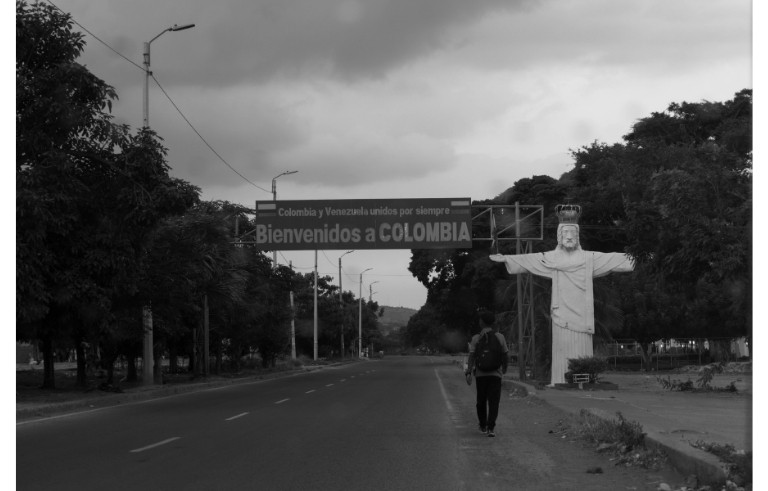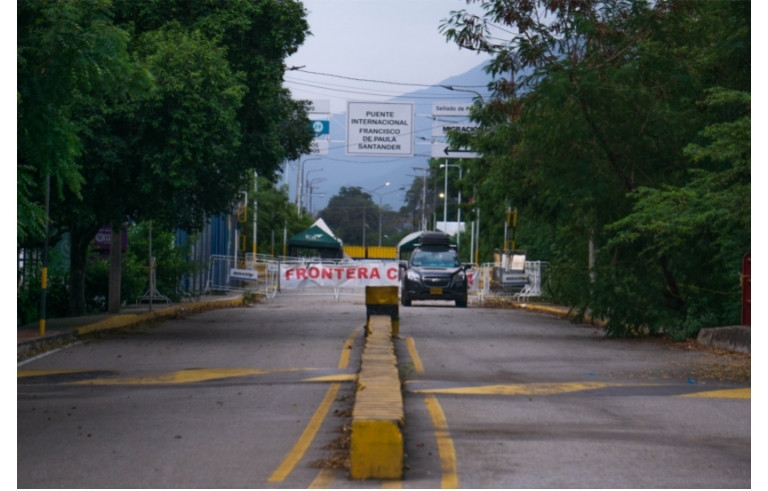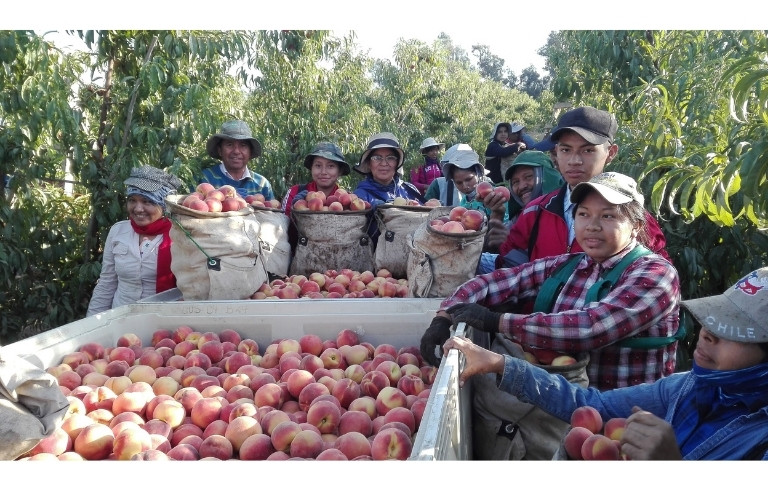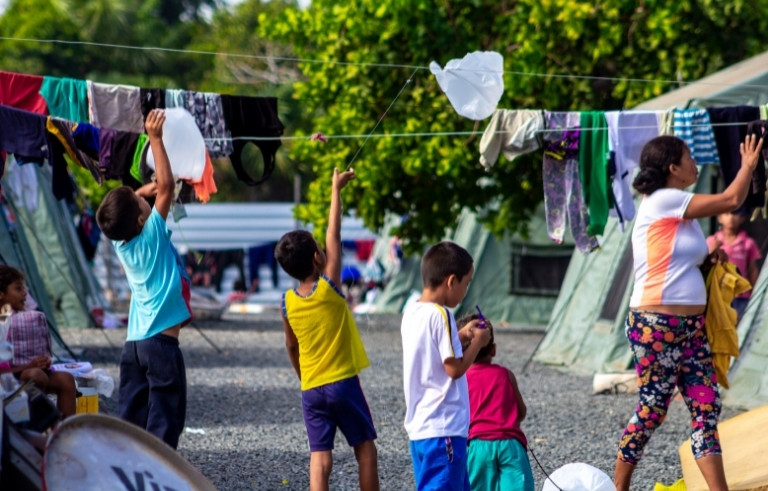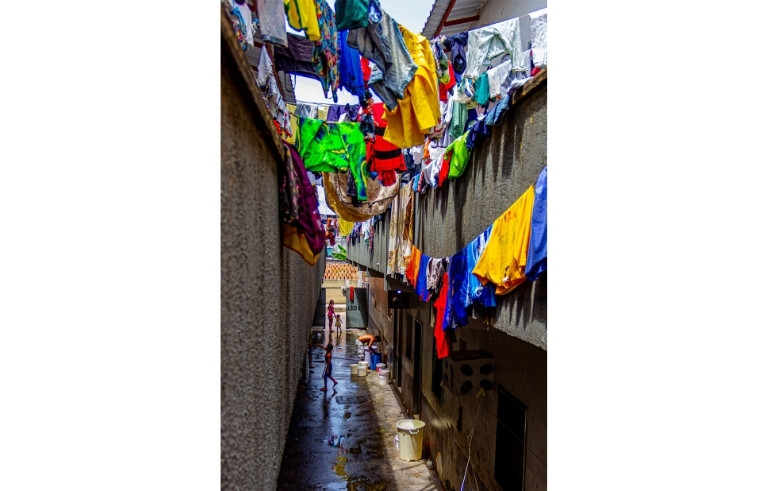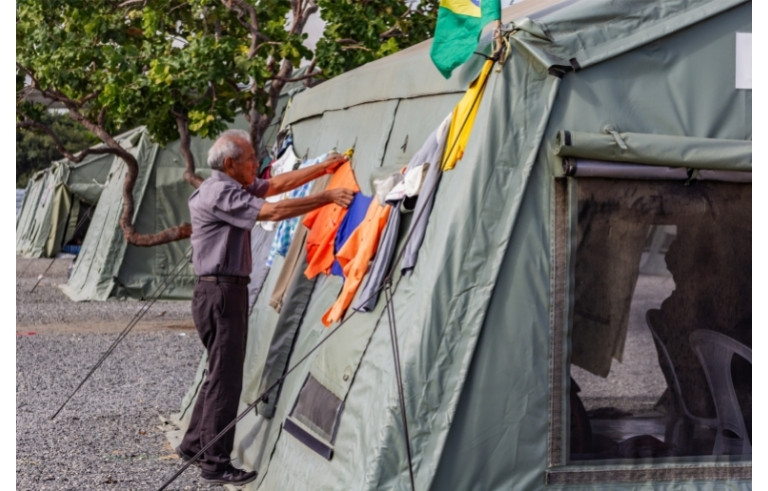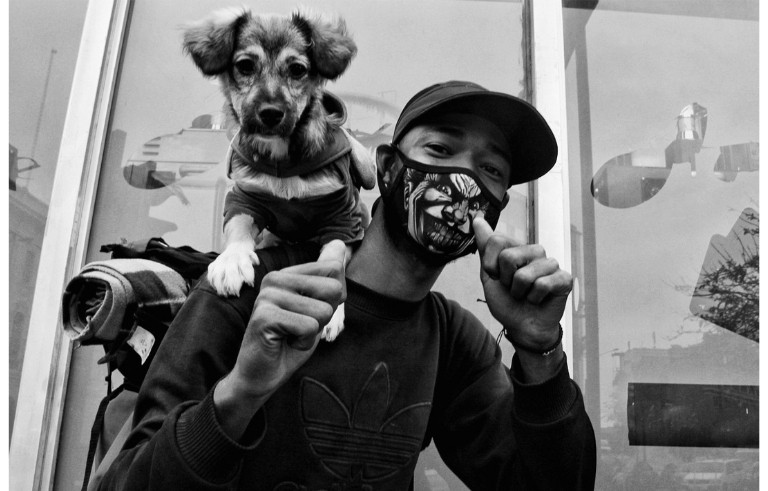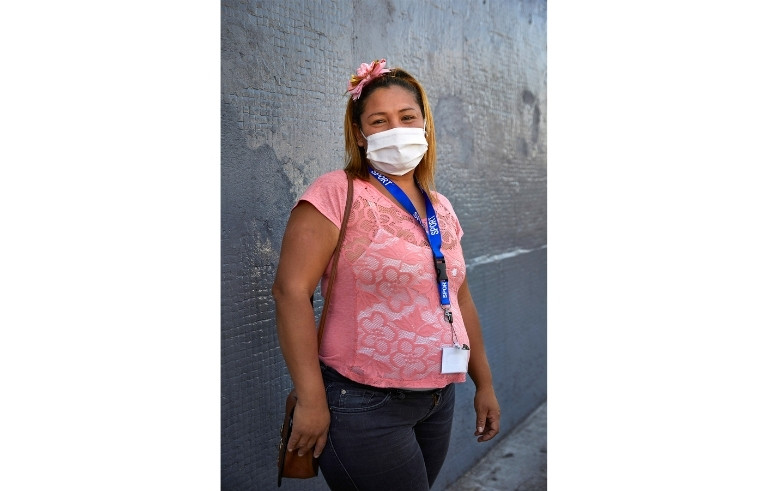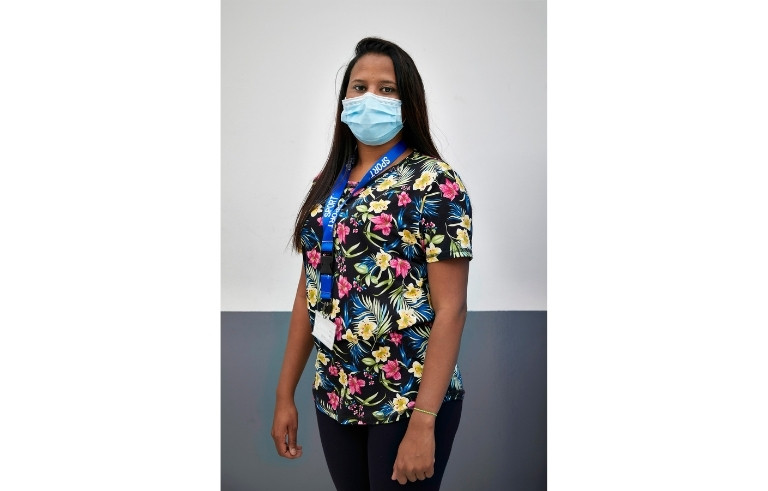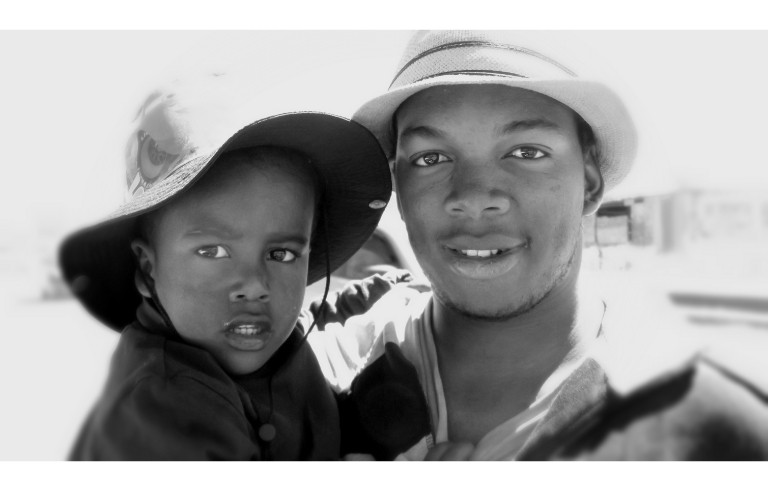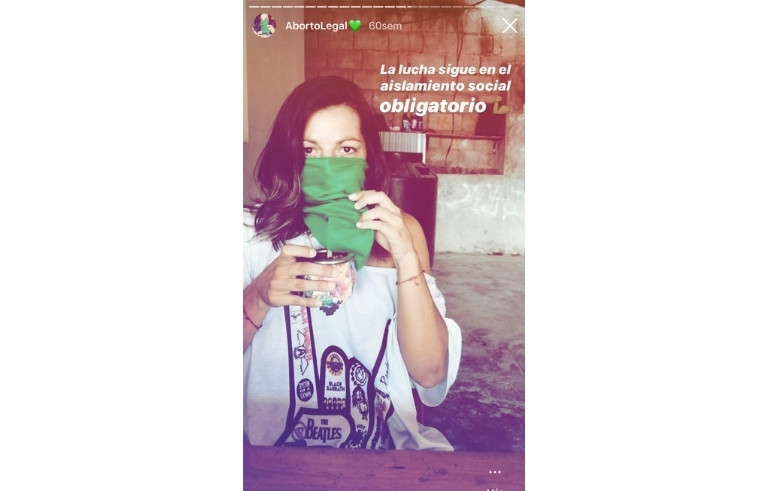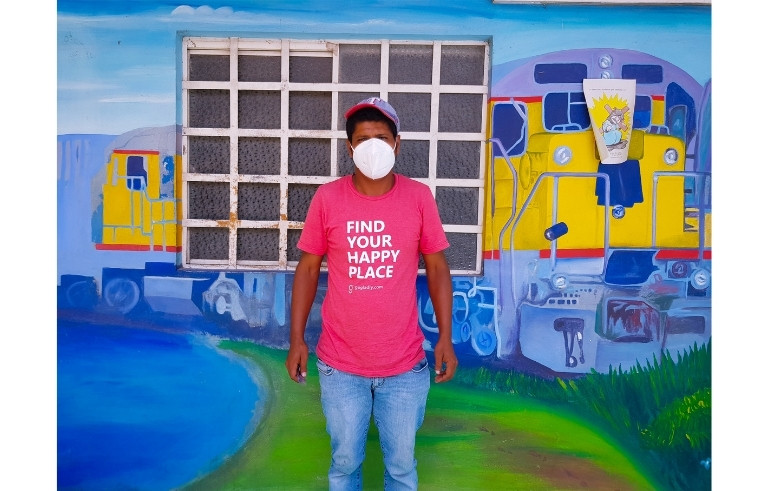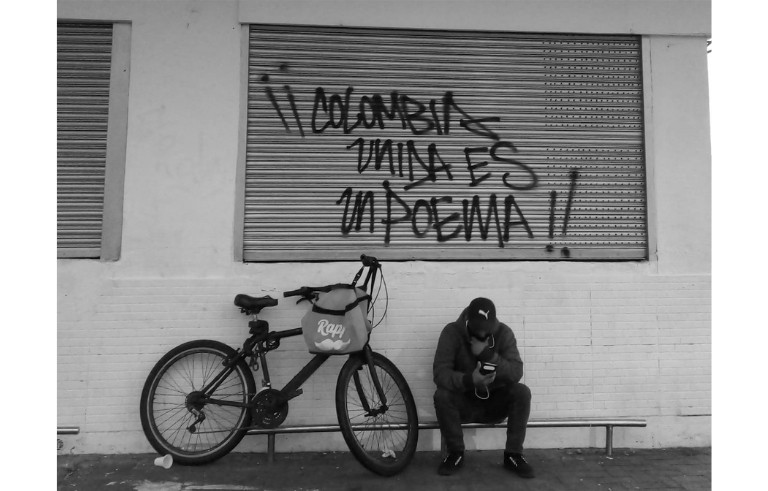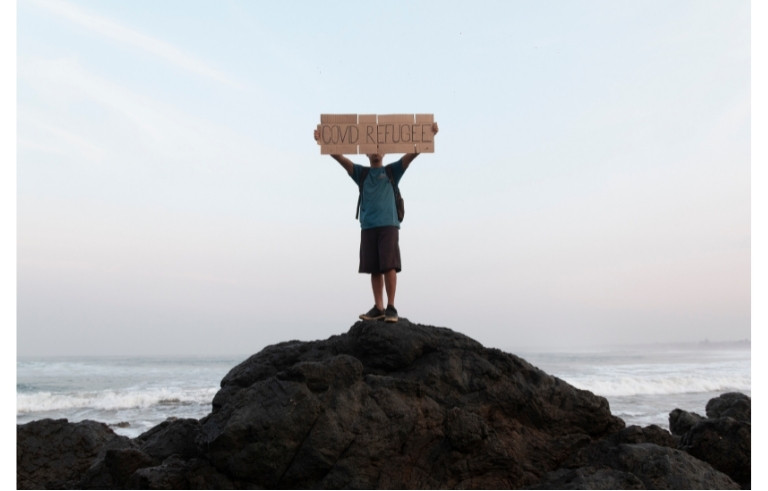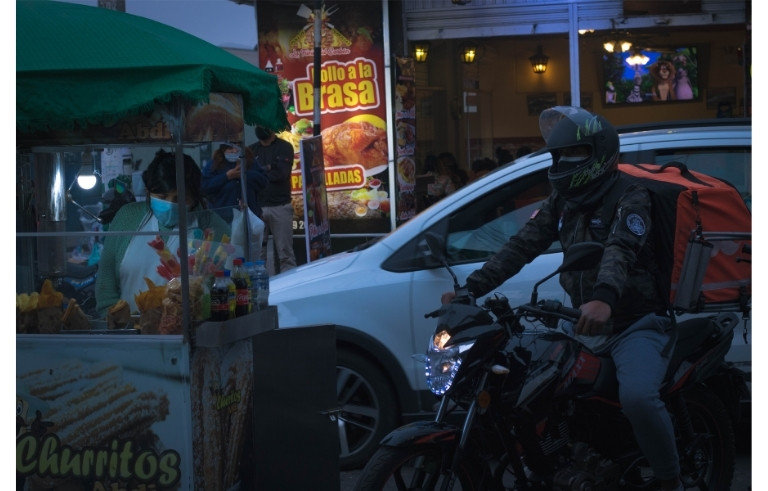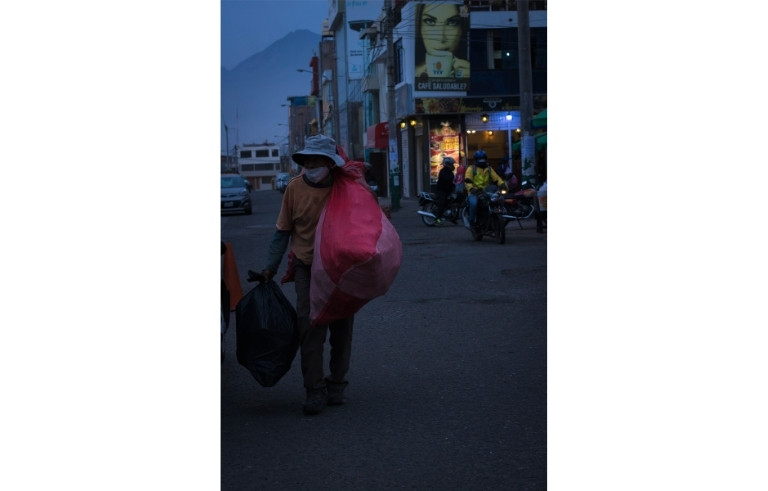Concurso de fotografia: Migração Transnacional e COVID-19 na América Latina
Este projeto inclui um concurso de fotografia e uma exposição virtual sobre o tema da migração e do COVID-19 na América Latina.
O nosso objetivo é documentar as vozes e as imagens de migrantes que viveram na América Latina durante a pandemia de COVID-19. O concurso foi aberto a migrantes de qualquer país do mundo que viveram ou cruzaram a América Latina, bem como a organizações de migrantes de qualquer país da América Latina (América do Sul, América Central e Caribe). O concurso de fotografia foi realizado entre maio e junho de 2021. As fotos foram tiradas entre março de 2020 e abril de 2021. Um painel formado por especialistas em migração e fotojornalismo avaliou as inscrições. Três prêmios foram concedidos:
Primeiro lugar (£750) - Verónica Anais Montoya (Venezuela)
Segundo lugar (£500) - Carla Bravo (Bolívia)
Terceiro colocado (£250) - Bruna Curcio (Brasil)
Menção especial - Tom Niño Román (Peru)
Uma seleção das imagens também será impressa em cartõeseducacionais que podem ser usados em ambientes educacionais e para aumentar a conscientização sobre a migração em geral e como ela foi afetada pelo Covid-19.
Este projeto foi liderado por:
- Prof Tanja Bastia, Universidade de Manchester
- Dr Erika Busse Cárdenas, Macalaster College
- Dr María Calderón Muñoz, pesquisadora independente
Queremos agradecer a participação e apoio da antropóloga visual Dr Verónica Castro, que junto ao designer Nuno Matos, desenharam a série de cartões. Verónica também participou no processo de seleção e tradução do material para o português. Também gostariamos agradecer a Emilia Thomas Cárdenas pela tradução do material do español para o inglês.
Agradecemos ao Fundo Catalisador de Responsabilidade Social do SEED da Universidade de Manchester por fornecer os fundos necessários para tornar este projeto uma realidade.
Photograph descriptions
Primeiro lugar: El COVID viaja por trocha by Verónica Anais Montoya (Venezuela)
La frontera colombo-venezolana permanece cerrada con motivo del COVID-19. No obstante, diariamente cientos de venezolanos cruzan hacia Colombia por trochas, dada la necesidad. El cierre administrativo de la desdibujada línea fronteriza parece desconocer la realidad y la vitalidad de garantizar los derechos de los migrantes, por el contrario, se impone la política del abandono.
COVID Travels Through the Bush
The border between Venezuela and Colombia remains closed as a cause of Covid 19. Nonetheless, hundreds of thousands of Venezuelans cross the Colombian border through the bush every day, out of necessity. The administrative closure of this blurred border seems to ignore reality and the need to safeguard migrants’ human rights; on the contrary a policy of neglect is imposed.
Segundo lugar: Migrantes somos by Carly Bravo (Bolivia)
La presente foto es la experiencia propia, en compañia de compatriotas jóvenes migrantes bolivianos que realizaron su paso por la frontera Pisiga- Colchane; límite entre Bolivia y Chile en busca de nuevas oportunidades, desempeñándose como cosechador/a de duraznos de temporada en la Sexta Región de Rengo.
Without Thinking About It, We Are Migrants
The photo shown is my own experience, in the company of young fellow country people, young Bolivian farm workers that made their way through the border Pisiga-Colchane, between Bolivia and Chile in search of new opportunities. They are working as seasonal peach harvesters in the sixth region of Rengoo.
Terceiro colocado: Ao sol, ao vento (Al sol, al viento) by Bruna Curcio (Brazil)
"As roupas, as pessoas, as certezas - ao sol, ao vento.
1 foto do Abrigo Warao em Manaus, AM, Brasil. [Emma, this is the one that is vertical frame]
1 foto do abrigo Rondon 3 em Boa Vista, Roraima, Brasil. [Emma, this is the two potos in horizontal frame]
Fevereiro 2020"
In the sun, in the wind.
“The clothes, the people, the certainties – in the sun, in the wind”.
1 picture of the Shelter for Warao Venezuelan Indigenous in Manaus, Amazonas, Brazil.
1 picture of the shelter Rondon 3 in Boa Vista, Roraima, Brazil.
February 2020
Menção especial: Venezolanos en Perú by Tom Niño Roman (Perú)
La vida de inmigrantes venezolanos en el Perú, dejando familias, educaciones y trabajos, para hoy estar en las calles rogando ayuda. Con humildad y respeto a todos.
Venezuelans in Peru
This is the life of Venezuelan immigrants in Peru, leaving behind family, work and education to be on the streets begging for help. Showing modesty and respect towards everyone.
Mujeres Luchadoras by Karen Toro (Ecuador)
"Como mujer migrante retornada, uno de los temas en los que trabajo es en hacer visible el trabajo de las comunidades migrantes en distintos ámbitos. En los retratos presentados vemos a Dayana Medina y Wilkerdys Sánchez, dos jóvenes venezolanas que en plena pandemia se han organizado para gestionar ayuda humanitaria para migrantes y refugiados de diferentes nacionalidades.
Quito, Ecuador. Noviembre 2020."
Women Fighters
As a migrant woman, one of the areas that I work in is to raise awareness of the work of migrant communities in different areas. In the photos shown, we see Dayana Medina and Wilkerdys Sánchez, two young Venezuelan women, who in the middle of the pandemic, managed to organise humanitarian aid for migrants and refugees from all different nationalities.
Sacar a la gente de las sombras by Estefanía de Jesús Sánchez Larios (México)
"Una frontera podrá separarnos, pero no habrá mayor unión que el amor de un padre por su familia.
Esta fotografía representa los rostros de migrantes en tránsito por Jalisco, México en busca del sueño americano. Con el objetivo de visibilizar a los rostros de los migrantes aún más en épocas de elecciones estadounidenses, así como su significativo tránsito por nuestro país, México.
Jalisco también es un referente de la migración internacional, cientos de personas transitan día con día arriesgando incluso sus propias vidas por el anhelo de llegar al otro lado.
No pude preguntarles sus nombres, ni su nacionalidad, sólo me sonrieron y nos dieron bendiciones por el agua que mi familia solía darles con gusto en el camino. Y en ese momento comprendí que todos ellos, todos los migrantes sacrificaban algo más, por una mejor calidad de vida. Todos ellos salían de sus sombras y luchaban paso a paso, vía por vía, para sumergirse en el sueño americano."
Taking People out of the Shadows
A border can separate us as people, but there will never be a greater connection than the love a Father has for his family.
This photo represents the faces of migrants travelling through Jalisco, México, searching for the American Dream. The objective is to make visible the faces of migrants especially now in times of American elections, as well as their significant crossing through our country, Mexico.
Jalisco is also a centre for international migration. Hundreds of people travel through each day, risking their own lives for their desire to get to the other side.
I couldn’t ask their names or their nationality; they only smiled and thanked us for the water my family gave them as they were travelling. And in that moment, I understood that all of them, all of the migrants sacrificed something greater, solely for a better quality of life. They were all leaving the shadows behind, fighting step by step, road by road, to become the American Dream.
Ni la pandemia, ni las fronteras nos paran by Carolina Belén Oviedo (Argentina)
"#SeráLey... se leía en las redes. El migrar y la pandemia no alejaron mi corazón de la lucha que nos encontró en las calles de Buenos Aires abrazadxs en un solo grito de emoción y sororidad... por allá... en el 2018 durante la media sanción de la Ley de Interrupción Voluntaria del Embarazo en la Cámara de Diputados, ley que ese año no logró sanción definitiva en Cámara de Senadores.
En 2020 la pandemia me encontró con el mate y el pañuelo en tierras lejanas, desde la amazonía peruana. Con los ojos cada vez más cansados y resignados a la era virtual pero la mirada activa, levantando el pañuelo verde por el derecho al aborto seguro, legal y gratuito para todas las personas con capacidad de gestar en la tierra donde nací.
Entre mates, el aislamiento social obligatorio, toques de queda y trámites migratorios paralizados, aprovechando el apogeo de la era virtual seguíamos abrazándonos por el reconocimiento histórico de nuestros derechos. 60 semanas después... seguimos en pandemia con aislamiento social obligatorio y toques de queda pero allá… en mi tierra… en Argentina... #EsLey... y será ley en toda América Latina porque ni la pandemia, ni las fronteras nos paran en la conquista de nuestros derechos."
Nor the Pandemic, nor the Borders will Stop Us
#SeráLey… was written online. Migration and the pandemic didn’t take my heart away from the struggle and pain that found us on the streets of Buenos Aires engulfed in emotion and sisterhood… back then, in 2018, during the mid-term approval of the Law of abortion in the Chamber of Deputies, a law that did not achieve final approval in the Chamber of Senators that year.
In 2020, the pandemic took me with the “mate” and the “pañuelo” to places far away, from the Peruvian Amazon. With increasingly tired eyes, resigned to the virtual era but with an active vision, raising the green handkerchief for the right to safe, free and legal abortion to all those with the capacity to bear children.
Among “mates”, mandatory social isolation, curfews and delayed immigration procedures, taking advantage of the virtual era at its peak, we continued to embrace each other for the historical recognition of our rights. 60 weeks later, we remain in a pandemic with mandatory self-isolation and curfews but over there, in my homeland, Argentina #EsLey… and it will be law in all of Latin America because neither the pandemic nor the borders will stop us in the battle for our human rights.
Find your happy place by Agustín Morales Mena (México)
"Foto tomada a compañero migrante en albergue La 72 en Tenosique, Tabasco, México en mayo 2021."
Find your happy place
The photo was taken of a fellow migrant in La 72 Shelter in Tenosique, Tabasco, Mexico in May 2021.
Unidos somos un poema by Daniela Buendía (Colombia)
Los servicios de mensajería y domicilios en Colombia, son, hoy en día, ofrecidos en su mayoría por migrantes venezolanos que han llegado a las principales ciudades del país y que encuentran en este sector de la economía una oportunidad para su sostenibilidad económica. En la foto se observa un hombre, migrante venezolano, sentado a las afueras de un mercado mirando su celular a la espera de un servicio de domicilio junto a su bicicleta. Justo en este lugar se lee un mensaje que dice: "Colombia unida es un poema". Este mensaje hace parte de los miles que se han pintado en los muros de la ciudad dentro de las manifestaciones sociales del paro nacional de los meses de abril y mayo en Colombia. La foto refleja dos realidades crudas del país en medio de la pandemia del COVID-19: la crisis de migración de venezolanos a Colombia y la ocupación en la economía informal y la crisis social y económicas del país actualmente.
United, we are a poem
Courier and home delivery services in Colombia nowadays are offered primarily by Venezuelan immigrants who have arrived to the main cities of the country and have found economic opportunities within the sector. In the photo, a migrant Venezuelan man is portrayed, seated on the outskirts of a market, next to his bike, looking at his phone waiting for a home delivery service. Right in this place, a message on the wall says ‘Colombia united is a poem’. This message is part of the thousands that have been painted on the walls of the city as a part of the nationwide social protests in the months of April and May. The photo reveals two stark truths of the country in the middle of the Covid 19 pandemic: the migration crisis of Venezuelans into Colombia and their place in the economy, and the current social and economic crisis in Colombia.
Fearless voids by Fieke van Berkom (The Netherlands)
The pandemic made me come home from Mexico to stay safe and sound inside my house in The Netherlands. In that period we were all confronted with ourselves and our home situations. A lot of insights appeared in my life back then. One of them is that staying between four walls and have this little space to move, play, work and live was really hard on me. I felt very lonely and disconnected, close to a depression. And when I left my house I got confronted with people who carried this fearful energy. Also in nature where I used to be alone, it got really crowded. There were less spaces where I could just BE and BREATHE.
So in December 2020 I decided to use my privileges and I went back to Mexico. For me this was a well considered choice to leave my country during 2020 to choose for my mental and physical health. I chose a type of quarantine who would nurture me instead of made me sick. I just wanted to live in nature and have space to move and be. Without fear.
Día a día by Kiara Fernanda Tapia Chambi (Perú)
En Perú, el 70% de los trabajadores son informales, por lo que su trabajo día a día equivale a su subsistencia. En la última década, la migración venezolana ha aumentado, por lo que los refugiados para sobrevivir, tuvieron que adaptarse al estilo vida donde el trabajo se gana en las calles.
Day by Day
In Peru, 70% of workers are casual so that their work day by day equates to their survival. In the last decade, Venezuelan migration has increased so that refugees have had to adapt to a new style of life where work is earned on the streets in order to survive.

